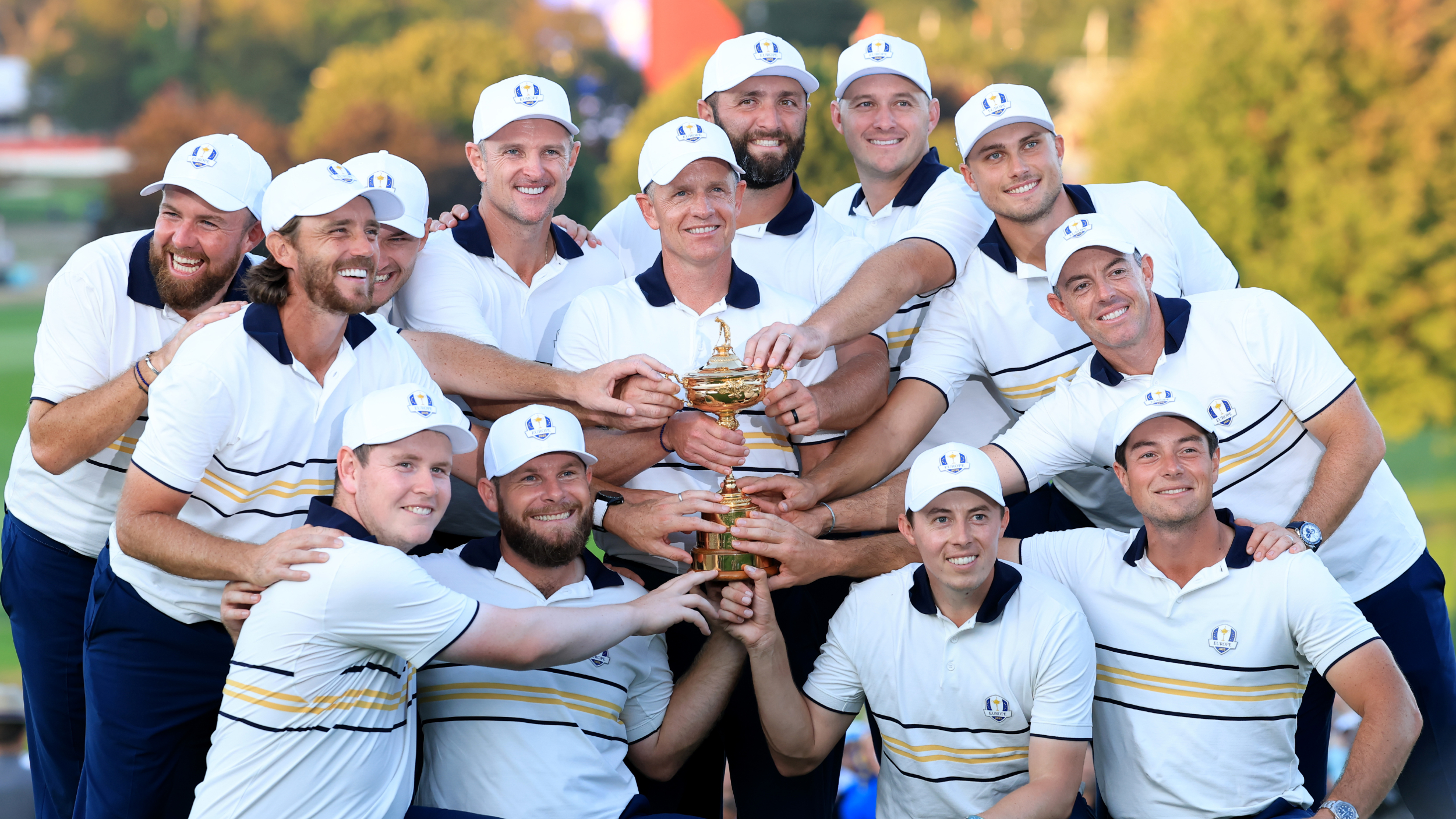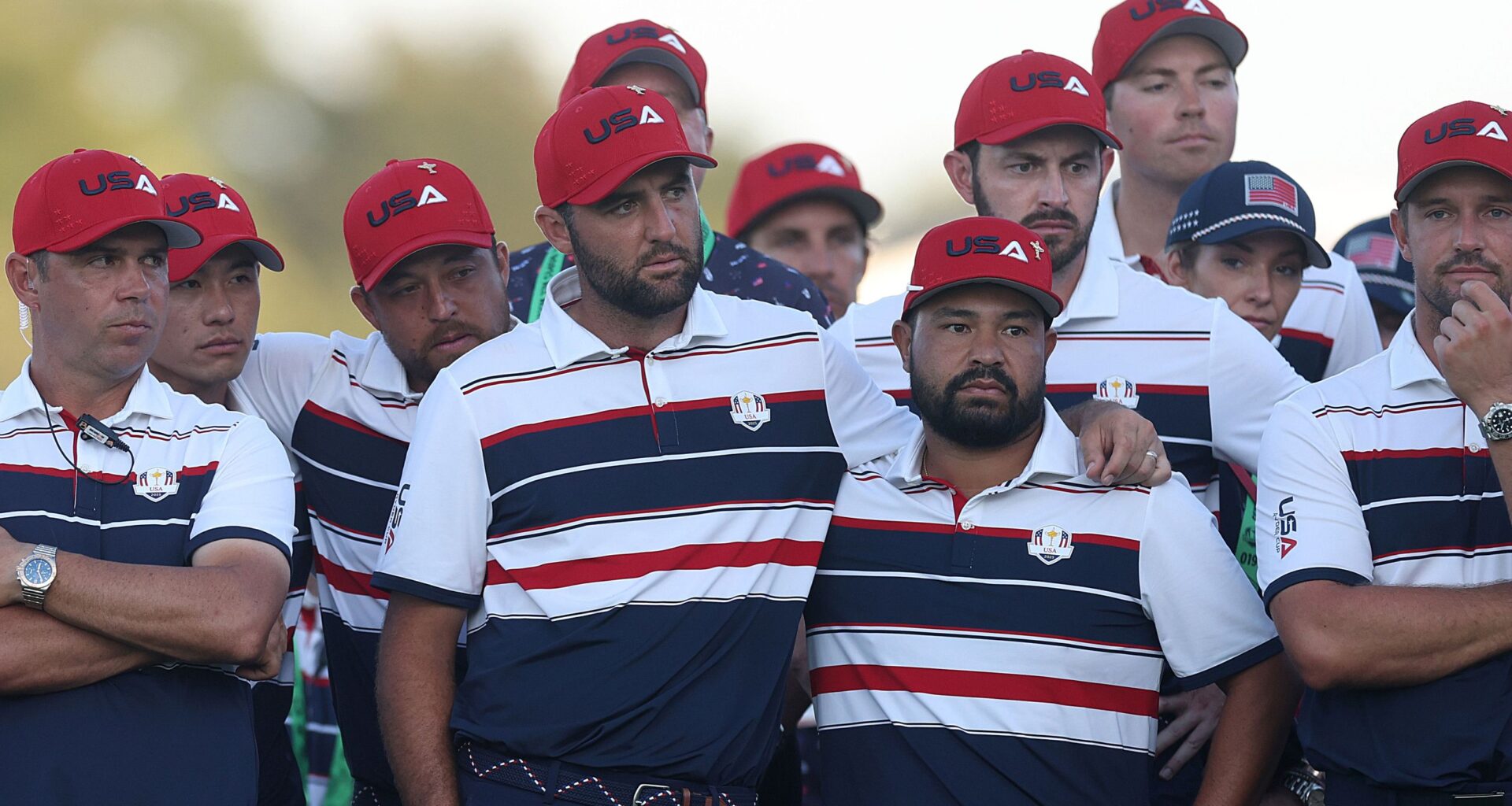Perspective is everything. Did the USA lose the Ryder Cup at Bethpage Black because their best player recorded one point from a possible five? Because the American captain, Keegan Bradley, put out the worst-ranked foursomes partnership twice? Or is it something more deep-rooted?
Some would argue staunchly for the former two points – most likely those of an American persuasion – as a means of deflecting from the overarching issues that seem to perennially plague the US outfit: a fundamental and ingrained problem when it comes to fostering brotherhood and camaraderie.
It’s perplexing but also, paradoxically, not at all surprising. Let’s deal with the first part of that apparently contradictory sentence before delving deeper into the second.
You may like
America prides itself on being the greatest country in the world. That messaging is constantly delivered in US society, starting at kindergarten. It’s verging on indoctrination. That’s why there’s such deep reverence for the military.
In England, where I’m from, I wouldn’t thank someone for their service as a matter of course – not because I’m not grateful, but because it’s not something that’s been instilled in me. Failing to do that in America is almost seen as blasphemy.
So shouldn’t intense patriotism translate to strong team spirit in events like the Ryder Cup? At the very least, shouldn’t bonding and brotherhood come more naturally to a country over a continent with disparate cultures and languages? You’d think so, but it’s a bit of a double-edged sword.
Mentally, if you think you’re the best and believe that with all your heart, it can be very hard when things start to get away from you, as they did in the morning foursomes on Friday – it’s almost as if the cloak of invincibility has been ripped off.
Not only are you losing, but you’re losing when you and your whole nation believes you should be winning. You’re battling expectation and reality. That’s challenging.
It’s also hard to create an intense and burning team spirit if you are – or indeed you believe you are – the best. Teams who go up against the USA, whether Europe in the Ryder Cup or other sports, tend to have an underdog mentality, which can be very powerful.
Even if they’re not actually inferior on paper – you could argue Europe had the better team going into the Ryder Cup – they’re going up against the mighty and all-powerful Americans. Everyone tends to raise their game in that scenario.
The crowd feeds into this dynamic too. Raucous and at times unacceptable fan behaviour is supposedly a demonstration of patriotism and supposed to intimidate, but it often serves to galvanise an already motivated team. That’s exactly what happened at Bethpage.

Some American fans took the heckling too far
(Image credit: Getty Images)
Some will point out, quite rightly, that America pulverised the opposition four years ago at Whistling Straits, but Europe was in a transitional period and Covid restrictions limited the number of fans who could travel. And when you have incredible talent, sometimes that will win out.
Some will also point out that I’m not from the USA and therefore lack the innate understanding of what it means to be American. That’s fair and true, but I’ve visited more than 30 states and been to the US at least 20 times. This is my view based on what I’ve seen, heard and experienced.
Every Ryder Cup, it feels as if America is forcing something that should be organic. Think about the Task Force that was set up following the USA’s defeat at Gleneagles in 2014 to rectify a run of poor form.
You can have as many contrived initiatives and knee-jerk reactions as you want, but if one team wants it more than the other, they’re likely to come out on top more often than not.
Luke Donald also did a phenomenal job of rallying the Europeans around the ‘our time, our place’ mantra, and conveying just how much the Ryder Cup meant to players like Seve Ballesteros. The Americans lacked a similar narrative and constantly had to bat away questions around being paid to participate.
The cultural differences between the DP World and PGA Tours also factor in. In Europe, players stay in the same hotels, go out for dinner together during tournaments and generally socialise more.
In America, players travel much more frequently with their families. If you spend time with people outside of work, you’re more likely to build stronger bonds. It’s not rocket science.
The role of individualism in US society is also worth considering. The American Dream is espoused as a national ethos and stresses the role of the individual in creating a better life for themself. The collective isn’t mentioned.
Success is also often defined in monetary terms and people are lauded for accumulating wealth. When it comes to sports contracts, players want the label of being the highest paid at their respective positions. It’s a source of pride.
It’s interesting that arguably the most successful ever American team sportsperson, Tom Brady, repeatedly took payments under his market value so the team could prosper.
I also find it fascinating that Americans tend to dominate in the singles. During the four-balls and foursomes – when the Ryder Cup is still very much alive and you’re playing alongside one of your peers – Europe generally has the upper hand. Is that a coincidence?

The victorious European team celebrates another Ryder Cup victory
(Image credit: Getty Images)
Of course, any team is going to struggle when their best players don’t come to the party, and I probably wouldn’t be writing this article if Scottie Scheffler and Bryson DeChambeau contributed more than two-and-a-half points from a possible ten.
European top-dogs have historically performed much better. At Bethpage, Rory McIlroy and Tommy Fleetwood won seven-and-a-half points from a possible ten.
This isn’t anything new, though. During their Ryder Cup careers, Tiger Woods won 14.5 points from a possible 37 and Phil Mickelson contributed 21.5 from a possible 47.
While America deserves a lot of credit for the fight on show during the Sunday singles, it’s easier to play good golf when you have nothing to lose. I suspect had it been closer heading into the final day, Europe would have found another gear.
In the post-round interviews, there was a lot of emotion on display from the likes of Scheffler and DeChambeau. The Ryder Cup clearly means a lot to them. But do I think Bryson is playing for, say, Ben Griffin in the same way Rory is playing for, say, Rasmus Hojgaard? No I don’t.
With the Europeans, history, legacy, pride and camaraderie are all wrapped into the package. Simply put, it means more to them.
Did the Americans cross the Atlantic for a scouting and bonding trip before the 2023 Ryder Cup at Marco Simone? What percentage of the American team comes to Europe in the autumn to compete in conditions they’re likely to face in away contests?
Once again, the American team members and leadership need to take a long, hard look at themselves. A mindset shift is required. It’s easy to say how much something means to you, but actions speak louder than words.
Quiz! Can you name the golfers with the most Ryder Cup appearances?

